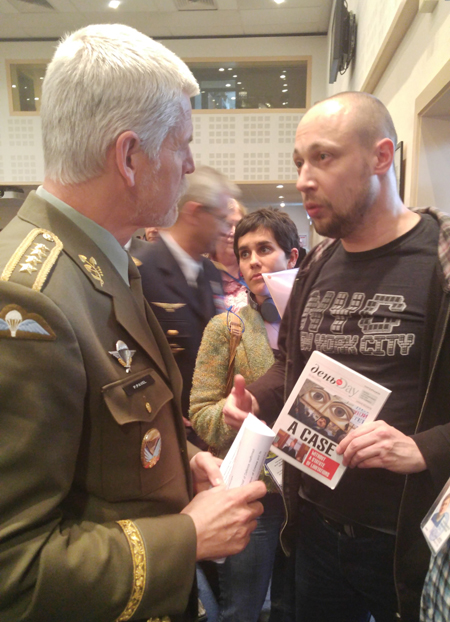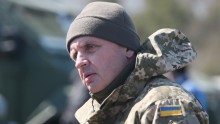Just as foreign ministers of NATO nations held their meeting in Brussels, other events happened in the city in parallel. In particular, Chief of the General Staff of the Ukrainian Armed Forces (UAF) Viktor Muzhenko was on his working visit to the headquarters of the alliance, when on May 18 he held a meeting with leading NATO powers’ chiefs of staff. During the meeting of the alliance’s Military Committee in the NATO-Ukraine format, Muzhenko delivered a report which highlighted the current situation in the Donbas and possible future scenarios. In addition, Muzhenko reported on chief provisions of the strategic military bulletin, which is scheduled for approval soon, and spoke about major directions of the UAF’s state development program, to be implemented until 2020. On May 19, Muzhenko met with Commander-in-Chief of NATO Forces in Europe Curtis Scaparrotti.
The main questions raised included stages of the Ukrainian military’s transformation which has to make it NATO standards-compliant, bilateral military cooperation and the issue of assistance to Ukraine, in particular technical assistance ranging from uniforms to communication devices, transportation vehicles, and medical equipment.
It is worth saying that certainly, not only the UAF, but also all of Ukraine is still far from the NATO benchmark. So, now we can talk only about NATO-Ukraine cooperation and possible assistance. Incidentally, Scaparrotti, who obviously takes a stronger stance on providing lethal weapons to Ukraine than Chairman of the NATO Military Committee Petr Pavel, said at a press conference held at the headquarters on May 18 that NATO could only offer political assistance to Ukraine for the time being. In particular, he said: “The most effective support that we can provide to Ukraine is political support, a joint NATO-EU effort to maintain sanctions, and training and advice support for its armed forces.” He added: “The Minsk process may not be a perfect path for a political solution, but it is the path we have before us.” On the other hand, it is amazing to see an obvious disagreement reflected by conflicting NATO statements, since NATO Secretary General Jens Stoltenberg repeatedly emphasized on the same day that he considered the Russia-NATO agreement still binding. So, what sanctions are we talking about? In fact, NATO will continue to try to use all possible means to maintain dialog, to “persuade” the Kremlin not to “brawl.”
Generally speaking, democratic nature of Western politics is sometimes over the top, and it shows in some characteristic details. A small observation: Europeans are holding a competition for the most insulting poem about Turkish President Recep Erdogan, while Rossiya 24 TV channel is being broadcast right at the entrance to the NATO headquarters. Let us recall that it was Turkey that downed a Russian plane when it violated Turkish airspace, and thus, it seems, scared the alliance. Yes, the incident scared Russia less than NATO, which immediately began to speak of the need for peaceful dialog between the parties (that is, NATO avoided recognizing itself as a party to the incident!).

While visiting the headquarters of NATO in Brussels, Den/The Day’s reporters presented Chairman of the Alliance’s Military Committee Petr Pavel with a copy of our English-language book A Case, published in Den’s Library series, which was compiled by Ivan Kapsamun. “In this book, you will find not only an unvarnished vision of contemporary history of modern Ukraine,” the journalists explained to Pavel, “but also coverage of origins of the great tragedy brought by the ongoing war and occupation of our territories. And, finally, it studies reasons for Ukraine stumbling on its path towards NATO at some point, which saw us wasting time, that most valuable resource, which we are now trying to regain by catching up.” In addition, we presented Ukrainian-language books “The Trap,” or A Case without a Statute of Limitations (compiled by Kapsamun) and I, an Eyewitness. Notes from the Occupied Luhansk (authored by Valentyn Torba) to Chief of the General Staff of Ukraine Viktor Muzhenko. “We came very close to Luhansk and had a chance to liberate it,” the Ukrainian general said when accepting the gift. / Photo courtesy of the author
Let us recall also that before both world wars, it seemed that there were no preconditions for major killings to occur. After all, going on a killing spree is inefficient and generally unreasonable. The end result is well-known. Millions of people died, prompting the world to establish a new system of collective security based on the principle of checks and balances. And now it seems that the world which ought to learn its lessons is again on the verge of a big trouble. It, of course, would be neither efficient nor reasonable, just as before. But the fact of the matter is that the aggressor’s logic always comes from a different coordinate system. Casus belli for a major war exists, and it is not Vladimir Putin’s possible attack on a NATO member which would compel the alliance to use force. Pavel said on May 18 that even airspace violations by Russian military aircraft did not meet the threshold for activation of the NATO Statute’s Article 5, dealing with collective defense.
The major war’s precondition is precisely a strong party’s willingness to appease the aggressor, to sacrifice small bits of peace for the greater peace. It turns a blind eye to the crisis in Ukraine, which is not a member of NATO, strengthens presence in Eastern Europe, but does not provide lethal weapons to Ukraine, and so on. It reflects the West’s hope that things will calm down if it refrains from drastic actions. Their vision of Russia’s behavior, again as declared by Pavel, is that Russia simply wants to maintain influence “on its periphery.” Speaking of the “periphery,” Pavel meant Ukraine as well. Meanwhile, NATO believes that Putin has no need for a major war. It is a perfectly logical position which is, however, contrary to the Kremlin’s philosophy of history.
The Day’s reporter asked a few questions of Chief of the General Staff of Ukraine Viktor Muzhenko at the NATO headquarters on May 19.
“ALL NATO CHIEFS OF STAFF UNANIMOUSLY SUPPORT UKRAINE”
What are the results of your meeting with the NATO chiefs of staff, held on May 18?
“The result is positive, and I mean not only bilateral meetings. After our report, the meeting approved documents on assistance for Ukraine, and all the chiefs of staff offered unanimous support for us. We discussed a wide range of issues, not limited to the Donbas. The threat emanating from the Russian Federation covers a whole range of areas. This applies not only to the south-eastern direction, but the southern one as well. Potential dangers are many.”
What special features are there in the strategic military bulletin proposed for this year?
“The bulletin is a strategic document for the development of the sector of defense and security and the development of the UAF. Its key new feature is that this document provides a clear demarcation of functions and powers between the Ministry of Defense and the General Staff, clarifying issues of subordination. In addition, the bulletin includes a number of documents that cover our vision for the UAF’s future, including bringing them in line with NATO standards.”
At what stage is Ukraine’s effort to achieve compliance with these standards?
“We are keeping up a fruitful work on standardization. NATO experts noted progress made in this process. We focus on the standards of operational and strategic levels. For it, we take into account the experience of our military and NATO trainers which we acquire, in particular, on the Yavoriv Training Ground. This concerns the establishment of the Special Operations Forces (SOF) as well. It involves our SOF instructors and soldiers working in parallel with training offered by foreign instructors.”
If it is decided to deploy an OSCE police mission in the Donbas, how will its presence influence the UAF’s activities? Would not it become an obstacle to the restoration of our territorial integrity?
“The issue of sending an OSCE police mission to the Donbas is still under discussion. If such a decision is taken, then we will talk to the OSCE about its cooperation with the UAF. For now, we have only an OSCE monitoring mission working in the Donbas. I would like to see them working effectively, but we are still seeing endless violations of the Minsk Agreements by the Russian occupation army. For example, we observed the militants using heavy weapons yesterday. This was the first use of heavy artillery since April 30.”








